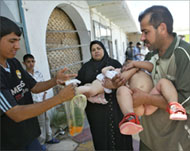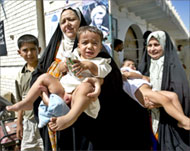Al-Sadr stays a cut above the rest
At a cultural centre in a working-class neighbourhood on the west side of Baghdad, Iraqi hearts are being won by blades and blood, but not of the violent kind.

Three bearded and burly Shia Muslim militiamen hold down Karrar as a former Iraqi army doctor lifts up the tearful nine-year-old’s white robe.
“It’s OK, everything will be fine, Sayyid Muqtada [al-Sadr] will come to see you now,” Mushtaq Abd al-Wahid, 27, whispers into the boy’s ear as a big poster of the Shia leader, frowning and dressed in his trademark black robes, stares down from the wall.
Doctor Amer al-Ankabi, 44, approaches Karrar with a pair of
pincers and inspects the screaming boy. He concludes it would be too dangerous to perform the circumcision, saying the procedure involves cosmetic surgery.
“It was not done right the first time and some foreskin was left around the tip,” says his disappointed father Ahmed Abd al-Kadhim, 33.
A relieved Karrar is led out and in comes his brother Hussein, four.
Al-Sadr’s gift
With an electric cutter, the procedure lasts just seconds.
A smiling and triumphant-looking Ahmed lifts up his tearful boy
in his arms and takes him outside, penis exposed.
 |
|
Al-Sadr partisans: We provide |
The boy is handed a bag of chocolates with a piece of paper inside reading: “Gift of the office of the martyr Sadr,” referring
to al-Sadr’s late father Muhammad Sadiq al-Sadr, a widely respected religious leader who was assassinated in 1999.
About 100 anxious mothers and fathers with babies in their laps or children clutching their hands waited their turn on Saturday in the courtyard of al-Sadr cultural centre in al-Amil, a poor neighbourhood on the capital’s west side.
The free circumcision is announced over a huge loudspeaker outside the centre and on banners hung all over the district.
“This campaign is made possible with God’s blessing, so please refrain from bringing musical bands with you, shooting in the air or doing anything contrary to Islam,” reads the banner.
Male circumcision is mandatory in Islam and dates back to a covenant believed to have been made between the Prophet Abraham and God thousands of years ago.
Supporting the poor
“It’s like my wedding day,” beams Riad Abboud, 30, holding in his arms his newly circumcised son, Mustafa, aged one.
Colourful streamers, Iraqi flags and posters of al-Sadr, his father and revered Shia imams hang all around the centre’s courtyard and families say they are planning parties for their circumcised little ones.
 |
|
The circumcisions are done for |
“We are doing this to support poor families,” said Shaikh Mahmud al-Subaih, an al-Sadr partisan overseeing the circumcision drive.
“We want to share the suffering and worries of our people.”
He said the centre was also offering lessons in the Quran as well as culture and ethics “to counter the invading US influence”.
Political ends
The use of circumcision for social coupled with political ends is not new in Iraq – under Saddam Hussein’s government, the procedure was provided free at offices of the ruling Baath Party on 17 July and 30 July every year to commemorate the party’s rise to power.
The move by al-Sadr’s partisans appears to be part of an effort to win grassroots support ahead of new elections due in December.
Although the 30-something cleric has stood aloof from the
political process, saying he is not interested in government posts, nearly 20 of his followers won election to parliament in
January as part of the main Shia alliance.
 |
|
A proud father after his son is |
“There is a time for study and there is a time for fighting. Sayyid Muqtada has told us to study,” said Ammar Sabah, 33, who fought against US troops last year with al-Sadr’s Jaish al-Mahdi (al-Mahdi Army) militia.
The bloody uprising in Shia areas of central and southern Iraq
lasted six months before the religious hierarchy brokered a
settlement under which the militia handed over its weapons.
Sabah, a fine arts student, is surrounded by other veterans of the fighting in the central city of Najaf and the Baghdad Shia neighbourhood of Sadr City, who have come to lend a helping
hand with the social operations.
And in poverty stricken post-war Iraq, it is not just Shia who are coming, despite reported sectarian tensions.
Ahmad Jamil and his wife Muntaha, both Sunnis from Ramadi, considered an anti-US stronghold west of the capital, also hold up their two newly circumcised boys with pride.